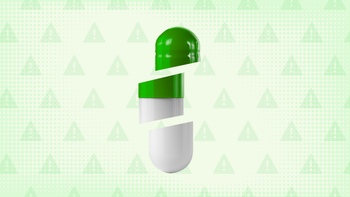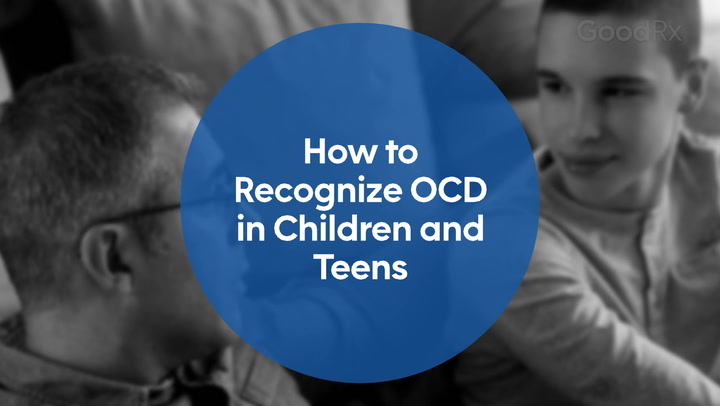
What Are the Best Medications to Treat Obsessive-Compulsive Disorder?
Key takeaways:
Obsessive-compulsive disorder (OCD) is a chronic mental health condition where frequent thoughts or behaviors can negatively affect people’s daily lives.
Medications like selective serotonin reuptake inhibitors (SSRIs) and clomipramine can improve chemical signals within the brain to reduce OCD symptoms.
Medication-free treatment, such as cognitive-behavioral therapy, is important in managing OCD and can be used in combination with medications.
Since medications for OCD may have varying effects for different people, make sure to discuss the risks and benefits of each medication with your provider.

People may have certain habits or quirks that they frequently do. For instance, this may include making sure that their closet is entirely color-coded or their kitchen is consistently spotless. However, these routines are not necessarily signs of obsessive-compulsive disorder (OCD).
A person with OCD may experience persistent thoughts that can greatly interfere with their daily life. Regardless of how hard they try, these thoughts and actions are often uncontrollable and difficult to stop.
Here we’ll discuss how OCD is treated, compare the effectiveness of different medications, and describe the best way to reduce OCD symptoms.
What is OCD?
OCD is a long-lasting mental health condition characterized by frequent thoughts or urges (obsessions) and repetitive behaviors or actions (compulsions) that people feel like they have to continue doing over and over again.
Although people without OCD may sometimes have certain intrusive feelings, they are usually able to recognize and move on from these disturbances. However, people with OCD are not able to do the same — these thoughts linger.
Examples of common thoughts and behaviors displayed in OCD cases include:
Repeatedly checking that things are done (e.g., doors are locked)
Keeping items in a specific order
Being overly cautious that everything is clean
Having persistent thoughts that are disturbing or violent
People with OCD may experience great anxiety and distress if they break away from these routines.
OCD often first appears in children and teenagers. It’s estimated that approximately 2% to 3% of people have OCD. Although we don’t know the exact cause of OCD, researchers believe that poor communication between different parts of the brain may play a role.
Can OCD be cured?
Unfortunately, there is no known cure for OCD. However, there are several different treatments available to help you manage your symptoms.
How is it treated?
People may experience significant improvement with the appropriate therapies. Cognitive behavioral therapy (CBT) can help people change their mindsets and avoid disturbing thoughts, emotions, or behaviors. CBT is a type of psychotherapy, or talk therapy, where mental health providers help people become more aware of their negative feelings through discussion and certain activities. Medications can also be used to improve chemical signals within the brain and reduce OCD symptoms.
What medications are used to treat OCD?
Different medications have been researched to treat OCD. These medications work by affecting different chemical messengers to help brain cells communicate better. Similar to medications used to treat anxiety and depression, these medications may take up to 12 weeks before people experience any improvements in OCD symptoms.
It’s important to know that FDA-approved OCD medications carry a boxed warning — the most serious FDA warning — because they may raise the risk of suicidal thinking and behavior, especially in younger people. Tell your provider right away if you notice an unusual change in thinking or behavior.
Selective serotonin-reuptake inhibitors (SSRIs)
Selective serotonin-reuptake inhibitors (SSRIs) were first developed to treat depression, but they can also be used to help treat OCD. These medications work by raising serotonin levels in the brain.
Serotonin is an important chemical signal that brain cells use to communicate with each other, and it also impacts your emotion and mood. By blocking transporters that lower serotonin levels, SSRIs enhance communication between brain cells by making serotonin more readily available.
Although SSRIs have fewer side effects compared to older antidepressants, such as monoamine oxidase inhibitors (MAOIs), they can sometimes cause dangerous reactions. In rare but serious cases, SSRIs can cause very high serotonin levels, leading to “serotonin syndrome.” When serotonin levels become dangerously elevated, people may experience tremors or shakiness, high fevers, changes in heart rhythm, and seizures.
However, for most people, the more common side effects include nausea and upset stomach, lower sex drive, and feeling too sleepy or having trouble falling asleep.
Below we will review four SSRIs that have been FDA-approved to help treat OCD.
Fluoxetine
fluoxetine (Prozac) is an SSRI used to treat OCD and other mental health conditions including depression, certain eating disorders, panic disorder, and bipolar disorder. The medication comes as a capsule or tablet that is taken once daily, usually in the morning. It is approved for adults and children 7 years and older for OCD.
Studies have shown that fluoxetine can be effective in improving OCD symptoms, with some research showing that it has long-lasting benefits — as long as 3 years. This is why the American Psychiatric Association recommends fluoxetine, along with other SSRIs, as one of the first-choice medications that can be used to treat OCD.
People taking fluoxetine may experience side effects such as:
Trouble sleeping or feeling more tired than usual
Dry mouth
Weakness
Nausea
Loss of appetite
Fluvoxamine
Fluvoxamine is used to treat OCD in adults and children 8 years and older. It’s usually taken nightly at bedtime, but larger doses can be divided and taken in the morning and at nighttime.
A small study showed that after taking fluvoxamine for 12 weeks, people with OCD experienced improvements in their daily lives in regard to their emotions, interactions with others, and overall mental health. Although this study looked specifically at the extended-release form of fluvoxamine, the immediate-release tablet can also be taken to treat OCD.
People may experience common side effects including:
Nausea
Headache
Sleep disturbances
Dry mouth
Weakness
Nervousness
Paroxetine
Paroxetine (Paxil) is an SSRI used to treat OCD and various conditions, including depression, panic disorder, anxiety, and post-traumatic stress disorder (PTSD). It is approved for people 18 years and older and is taken once a day.
Research shows that paroxetine may be as effective as other SSRIs, such as fluvoxamine, in improving OCD symptoms. Compared to other SSRIs used for OCD, paroxetine can cause more weight gain and would not be the best first choice for people with obesity or diabetes.
Other common side effects can include:
Nausea
Dry mouth
Lowered appetite
Constipation
Dizziness
Sleepiness
Shakiness (tremor)
Sweating
Sexual dysfunction
Sertraline
Sertraline(Zoloft) can be used to treat OCD as well as depression, panic disorder, PTSD, social anxiety disorder, and premenstrual dysphoric disorder (PMDD). Sertraline is taken once daily and can treat OCD in adults and children 6 years and older.
Sertraline was found to be effective in improving quality of life and preventing worsening symptoms in people with OCD.
Common side effects reported by people taking sertraline include:
Nausea
Diarrhea
Dry mouth
Fatigue
Trouble sleeping
Tricyclic antidepressants (TCAs)
TCAs were first developed to treat depression. They affect serotonin and norepinephrine in the brain to improve communication between brain cells. Norepinephrine is a chemical signal that helps control responses to stress, attention, emotions, and behaviors.
Clomipramine
Clomipramine is a TCA used to treat OCD in adults and children 10 years and older. The medication is taken once daily, usually at bedtime, to avoid daytime sleepiness.
According to research studies, people taking clomipramine report about a 40% to 50% reduction in their OCD symptoms. Providers may sometimes try combining clomipramine with an SSRI for people with OCD whose symptoms do not improve on the SSRI alone.
The most common side effects that people experience while taking clomipramine include:
Nausea
Weight gain
Tiredness
Sweating
Sleepiness
Dry mouth
Constipation
Dizziness
Shakiness (tremors)
Headache
Changes to libido
More severe side effects can include abnormal heart rhythms, liver disease, and seizures.
Which medication works best for OCD?
SSRIs, especially when combined with CBT, work best in lessening OCD symptoms. The American Psychiatric Association suggests switching to a different SSRI if the one you’re using isn’t helping. TCAs such as clomipramine may be used if SSRIs do not help improve OCD.
If OCD symptoms worsen or do not improve, providers may consider using medications off-label to treat OCD. These alternative medications include venlafaxine (Effexor), mirtazapine, and antipsychotic medications such as risperidone (Risperdal), olanzapine (Zyprexa), and quetiapine (Seroquel).
Medication-free treatments for OCD
As mentioned above, OCD treatment is usually more effective when medication is combined with CBT. This treatment aims to help people recognize harmful or negative feelings and find ways to help manage and control them.
Exposure and response prevention is a form of CBT used to treat OCD. It involves exposing people to triggers that elevate their OCD symptoms and helping them find healthy ways to deal with these feelings.
Can foods help OCD?
Good nutrition plays a big role in managing OCD since chemical signals within the brain rely upon vital nutrients to work effectively. Foods rich in proteins such as nuts, meat, eggs, and beans help provide your body with essential fuels. Proteins are broken down into amino acids that are used by your body to create important chemical signals to improve your mood and feelings. Eating complex carbs, such as whole-wheat bread and grains, provides your body with consistent energy levels.
Conversely, drinking too much alcohol can worsen OCD symptoms such as compulsivity or feeling an uncontrollable need to do a certain behavior. Some people with OCD may drink alcohol to help cope with their OCD symptoms, but the good feelings are temporary and may worsen your symptoms long term.
What happens if OCD is left untreated?
OCD can be very dangerous if left untreated. Since OCD negatively impacts your thoughts and feelings, it can make it difficult to focus on important activities in your life. Untreated OCD can lead to other mental health conditions, such as depression and anxiety. In severe cases, these feelings can result in thoughts of suicide.
If you or your loved one are experiencing thoughts of self-harm or suicide, the National Suicide Prevention Lifeline 1-800-273-8255 offers 24/7 support for people in distress, as well as other helpful resources.
The bottom line
OCD is a chronic mental health condition that can greatly interfere with people’s lives. Managing OCD involves CBT to change behaviors and taking medications to improve chemical signals within the brain.
SSRIs and clomipramine effectively reduce symptoms and improve the quality of life for people with OCD. People may respond differently to these medications, and one medication might work better for you than others. Since these medications have different side effects, make sure to discuss them with your provider to determine the best potential medication for you.
Why trust our experts?



References
American Psychiatric Association. (2007). Practice guideline for the treatment of patients with obsessive-compulsive disorder.
Angelakis, I., et al. (2015). Suicidality in obsessive compulsive disorder (OCD): a systematic review and meta-analysis. Clinical Psychology Review.
Brock, H., et al. (2022). Obsessive-compulsive disorder. StatPearls.
Bruggeman, C., et al. (2022). Selective serotonin reuptake inhibitor toxicity. StatPearls.
Bryant Ranch Prepack. (2020). Fluvoxamine maleate- fluvoxamine maleate tablet, coated [package insert].
Del Casale, A., et al. (2019). Psychopharmacological treatment of obsessive-compulsive disorder (OCD). Current Neuropharmacology.
Endocrine Society. (2022). Adrenal hormones.
Etain, B., et al. (2001). Value of fluoxetine in obsessive-compulsive disorder in the adult: Review of the literature. L’Encephale.
Fenske, J. N., et al. (2015). Obsessive-compulsive disorder: Diagnosis and management. American Family Physician.
Ferguson, J. M. (2001). SSRI Antidepressant Medications: Adverse Effects and Tolerability. Primary Care Companion to the Journal of Clinical Psychiatry.
Foa, E. B., et al. (2005). Randomized, placebo-controlled trial of exposure and ritual prevention, clomipramine, and their combination in the treatment of obsessive-compulsive disorder. The American Journal of Psychiatry.
Karci, C. K., et al. (2020). Nutritional and herbal supplements in the treatment of obsessive compulsive disorder. General Psychiatry.
Koran, L. M., et al. (2002). Efficacy of sertraline in the long-term treatment of obsessive-compulsive disorder. The American Journal of Psychiatry.
Koran, L. M., et al. (2010). Extended-release fluvoxamine and improvements in quality of life in patients with obsessive-compulsive disorder. Comparative Psychiatry.
Legacy Pharmaceutical Packaging, LLC. (2019). Fluoxetine- fluoxetine capsule [package insert].
Major Pharmaceuticals. (2019). Paroxetine- paroxetine hydrochloride tablet, film coated [package insert].
McKay, D., et al. (2015). Efficacy of cognitive-behavioral therapy for obsessive-compulsive disorder. Psychiatry Research.
Mundo, E., et al. (1997). Efficacy of fluvoxamine, paroxetine, and citalopram in the treatment of obsessive-compulsive disorder: A single-blind study. Journal of Clinical Psychopharmacology.
National Institute of Mental Health. (2020). Obsessive-compulsive disorder: When unwanted thoughts or repetitive behaviors take over.
OCD Clinical Practice Review Task Force. (2015). Clinical practice review for OCD. Anxiety & Depression Association of America.
Pallanti, S., et al. (2011). Obsessive–Compulsive Disorder Comorbidity: Clinical Assessment and Therapeutic Implications. Frontiers in Psychiatry.
Preferred Pharmaceuticals, Inc. (2020). Sertraline- sertraline tablet, film coated [package insert].
Rand. (n.d.). Co-occurring alcohol use disorder and obsessive compulsive disorder.
Reid, J. E., et al. (2021). Cognitive behavioural therapy with exposure and response prevention in the treatment of obsessive-compulsive disorder: A systematic review and meta-analysis of randomised controlled trials. Comparative Psychiatry.
Robbins, T. W., et al. (2019). Obsessive-compulsive disorder: Puzzles and prospects. Neuron.
Stein, D. J., et al. (2019). Obsessive-compulsive disorder. Nature Reviews. Disease Primers.
Zydus Pharmaceuticals (USA) Inc. (2020). Clomipramine hydrochloride - clomipramine hydrochloride capsule [package insert].
For additional resources or to connect with mental health services in your area, call SAMHSA’s National Helpline at 1-800-662-4357. For immediate assistance, call the National Suicide Prevention Lifeline at 988, or text HOME to 741-741 to reach the Crisis Text Line.

























